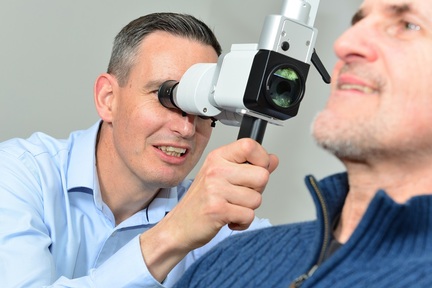Older people with dangerous hearing loss warned: 'Get your ears tested!'
Older people losing their hearing may be tempted to just turn up the volume on their hearing aids, but this could be completely risking their hearing altogether if they have a condition known as “sudden deafness”, warns a hearing expert.
Thousands of Britons each year are affected by this dangerous ear condition, which needs emergency treatment as soon as possible to prevent complete loss of hearing.

Sudden deafness is a ‘medical emergency’ but a treatable condition
Sudden deafness, which is also known as Sudden Sensorineural Hearing Loss (SSHL) is an emergency condition which typically occurs in only one ear but can appear in both.
It requires immediate action, according to Duncan Collet-Fenson, an audiologist and the managing director of Aston Hearing.
He says: “If you suddenly lost your sight you would most likely go to casualty but it's extraordinary how many people accept sudden hearing loss without seeking help. Fifty per cent of people with SSHL recover within two weeks if they receive prompt treatment.”
The audiologist is shocked by the amount of people who suddenly lose their hearing but don’t see it as something that needs to be checked out, saying “if you realised your sight wasn’t as good as it was previously, you would probably go to the optician. Unfortunately, people tend to wait much too long to get their hearing assessed and the longer they wait, the harder it is to treat hearing loss.”
However, it’s not just emergency conditions like SSHL that can be identified during a hearing test. Some reasons for a decline in hearing are straight-forward but have a really adverse effect on an older person’s day-to-day life.
For example, ear wax build-up is a major problem for effective hearing, but it’s easily picked up during examination by a specialist. Microsuction is the safest method of wax removal but a specialist is usually needed to perform this as wax removal is rarely performed by GPs now.
‘Hearing aids are not the same as glasses’; they need time to adjust
Untreated hearing loss in older people is now being routinely linked to several medical conditions including an increased risk of dementia, depression, falls and even strokes. Untreated hearing loss also leads to longer hospitalisations, readmissions and more visits to casualty.
Mr Collet-Fenson advises that hearing should be checked throughout your life, increasing to every three years between the ages of 45-60 and every two years if you are over 60 - or sooner if you suspect any sort of hearing loss.
There are roughly 11 million people in the UK currently suffering from hearing loss (which roughly equates to one in six) and of the six million people in the UK who could benefit from hearing aids, only two million have them, according to Mr Collet-Fenson.
He states that only 30 per cent of those with hearing aids actually use them regularly.
For those who are assessed and prescribed a hearing aid, many will often put it away in a drawer and only get out if they have people coming to visit, but Mr Collet-Fenson warns: “Hearing aids are not the same as glasses. Unlike when you get a new pair of glasses and you can instantly see well; the brain needs to adjust to the heightened awareness of sound coming from the hearing aid.
“It is therefore difficult to restore full hearing with hearing aids immediately and the aids may need multiple adjustments. The right one though can make a truly significant difference and can be life changing.”
'Just the effort of listening physically exhausts me’
There’s often a 10-year delay between the onset of hearing loss in an older person and the individual seeking help.
Mr Collet-Fenson believes this can be due to several reasons, such as the failure to recognise the symptoms, denial and stigma, as well as some GPs failing to refer some adults who could benefit from hearing services.
Although there is a direct correlation between ageing and hearing loss, age-related hearing loss often comes on slowly, making it harder for people to know when to take it seriously.
He says: “Age related hearing loss happens because the delicate hair cells of the inner ear are worn down and are not quite as effective as they used to be and need more volume to be stimulated, so you start to lose clarity.”
The hearing specialist says people who can’t hear well often become socially isolated and deprived of stimuli that keep the brain cognitively engaged thereby even potentially affecting brain function.
Not being able to hear properly is also an exhausting process for older people, especially those with extra care needs. The listening effort required with any degree of hearing loss is considerable. Mr Collet-Fenson says: “A comment we often hear as audiologists is ‘just the effort of listening physically exhausts me’.”
Latest News
 29-Jul-24
Dementia Bus gives carehome.co.uk staff insight into life with dementia
29-Jul-24
Dementia Bus gives carehome.co.uk staff insight into life with dementia
 27-Jul-23
UK's top home care agencies in 2023 revealed
27-Jul-23
UK's top home care agencies in 2023 revealed
 30-Nov-22
A quarter of older people keep their falls secret from family
30-Nov-22
A quarter of older people keep their falls secret from family
 29-Nov-22
'Covid-19 has not gone away' say terminally ill
29-Nov-22
'Covid-19 has not gone away' say terminally ill
 28-Nov-22
IT consultant who received poor care opens 'compassionate' home care business
28-Nov-22
IT consultant who received poor care opens 'compassionate' home care business